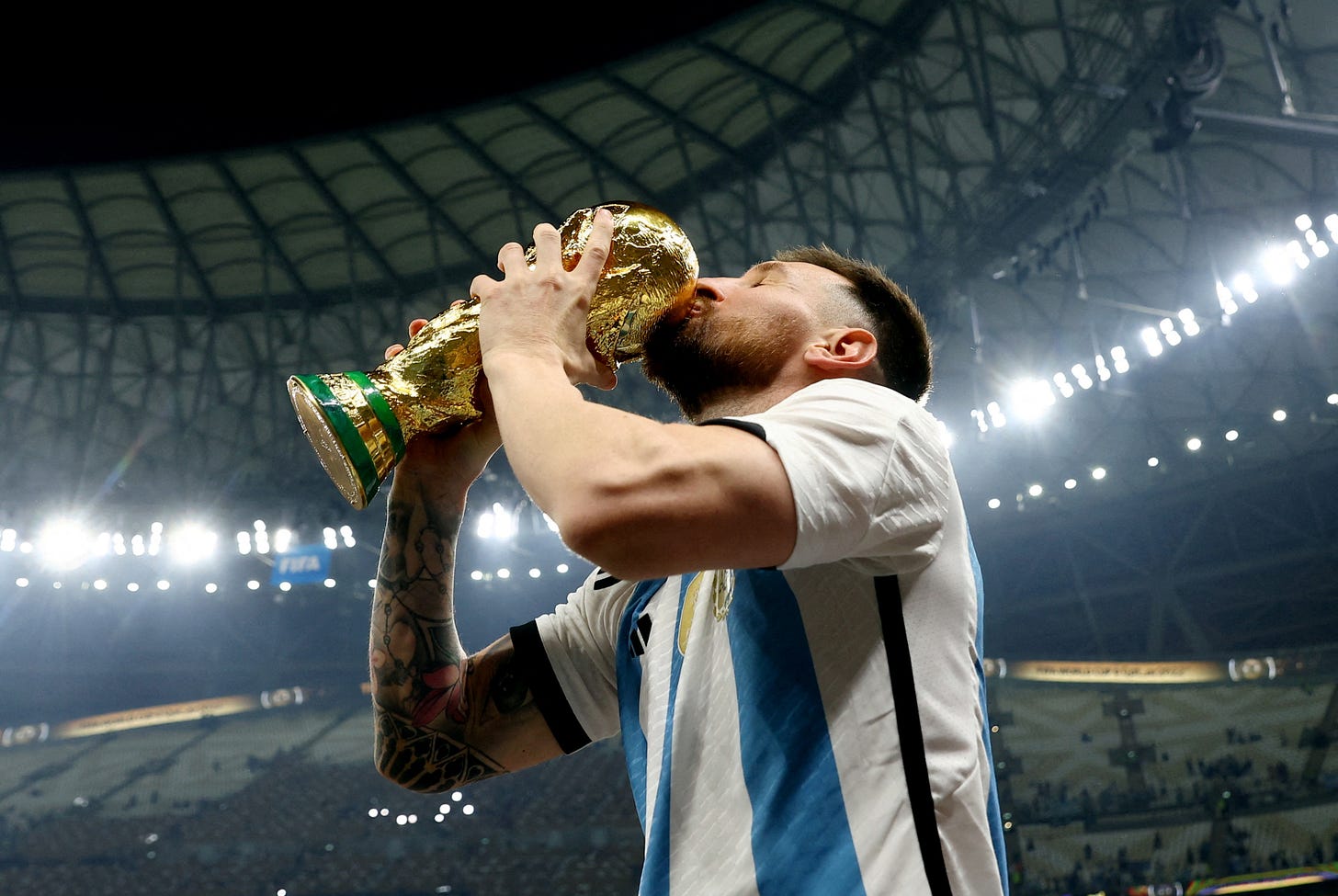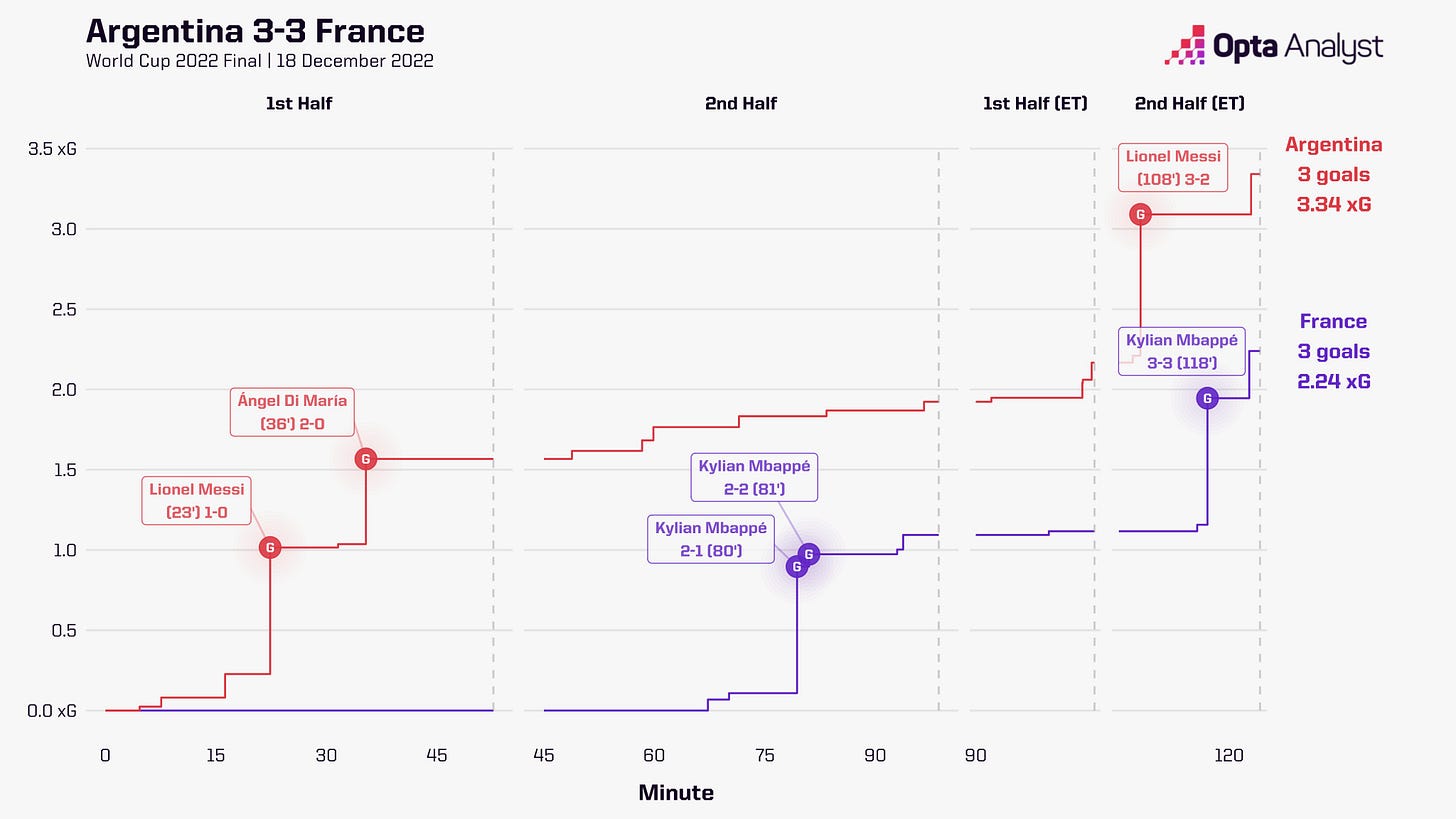Here we are again at the World Cup final.
Every time this comes around, it feels like a snapshot in history. I can vividly remember where I was in my life every time. I remember being a child enraptured by football for the first time in 2002. I remember being a moody git as a teenager when Zinedine Zidane got sent off in 2006. I remember being on holiday in Spain when the Spanish won it in 2010, feeling like I had no idea where my life was going in 2014, and starting to get off the ground with writing about football in 2018. The late, great, Grant Wahl said that it’s “not overstating things to say that I measure my life in four-year terms around these tournaments”. The more I do this, the more I feel the same way.
We all know this has been a controversial World Cup for many. I’ve spent a lot of time wondering if hosting the World Cup has “worked” for Qatar’s opaque aims. They’ve been getting slated regularly in the Western media, which I doubt they’re thrilled about, but I have no idea how much it matters to them. The fact that they’re so keen on bidding for the Olympic Games after this suggests that, yes, they’re happy with how the World Cup turned out. Does that mean we all failed to hold Qatar to account? Or does it mean that we’re totally powerless? Maybe it’s both, or maybe it’s neither.
At the start of the tournament, I donated to the Alwan Foundation, fighting for LGBTQ justice in Qatar. Today, I donated £100 to Migrant Rights, an organisation fighting for, well, the rights of migrants in gulf states such as Qatar and Saudi Arabia. This World Cup we’ve spent the last month watching was built on the backs of an exploited migrant workforce. I’m not so naive as to think donating to a charity can fix these problems, but it’s at least something, and I encourage you to do the same.
“Every great magic trick consists of three parts or acts. The first part is called ‘The Pledge’. The magician shows you something ordinary: a deck of cards, a bird or a man. He shows you this object. Perhaps he asks you to inspect it to see if it is indeed real, unaltered, normal. But of course... it probably isn't. The second act is called ‘The Turn’. The magician takes the ordinary something and makes it do something extraordinary. Now you're looking for the secret... but you won't find it, because of course you're not really looking. You don't really want to know. You want to be fooled. But you wouldn't clap yet. Because making something disappear isn't enough; you have to bring it back. That's why every magic trick has a third act, the hardest part, the part we call ‘The Prestige’.”
— The Prestige (2006, Christopher Nolan)
Lionel Messi is 19 years old. He’s leaving the World Cup making only a few cameo appearances and showing us just a glimpse of what he can do. He’s disappointed, but he needn’t worry. He’ll be back, and he’ll be the main event soon enough.
Messi is 23 years old. He’s leaving the World Cup after Argentina were humiliated 4-0 to Germany in a game that saw Diego Maradona’s side collapse. He didn’t quite get to show everything he can do, but most blame Maradona’s tactical choices. It’s not his fault, and everyone knows he’ll be back.
Messi is 27 years old. This is the one World Cup he plays in his supposed peak years. Alejandro Sabella has built the entire team around being as solid as possible and totally reliant on Messi in attack. It’s not quite enough. Messi has won everything with Barcelona but, for the first time in his career, people ask if it’s ever going to happen for him at the World Cup.
Messi is 31 years old. Argentina are a shambles and his sheer quality is the only thing holding the side together. It all goes wrong as everyone felt it would. Messi had probably missed his chance.
Messi is 35 years old. No one’s life gets measured in four-year terms around these tournaments more than him.
He has ended the debate. As far as I was concerned, he had already become the greatest of all time. Messi and Cristiano Ronaldo are jointly the two greatest goalscorers in the history of football, but Messi does everything else. He could have scored zero goals in his career and still been one of the best in the world, because he does everything in attack. It’s not just that he’s the best ever. It’s that it’s not even close.
But still, many people questioned it. Looking at just the goals and trophies, Messi and Ronaldo were similar. Some (wrong) people felt that Ronaldo had the edge in terms of his mentality and big game moments. Those people no longer have a leg to stand on. Messi is the greatest of all time and will be remembered as such by almost everyone. He’s answered the only plausible doubt. It was over for me a long time ago, but we can stop arguing now. He won.
The most remarkable thing about the World Cup final wasn’t that he did it, or that he did it by playing so well. It was that, for about an hour, the world believed it might not happen.
Argentina were brilliant for most of the initial 90 minutes. They played France off the park so much that Didier Deschamps’ team didn’t take a single shot for over an hour. This was arguably the most dominant any team has ever been in a World Cup final.
Ángel Di María beats Ousmane Dembélé in the box to win a penalty. Messi obviously takes the spot kick and puts it in the bottom right corner. Argentina then score a brilliant team goal, with Messi’s cute little pass feeding Julián Álvarez, who slides in Alexis Mac Allister to pass it to Di María for an easy finish. Argentina were tearing France apart. That was ‘The Pledge’. We’d been shown what we want to see.
From there, Argentina were really in game management mode. And they were in complete control. France had done everything wrong and Argentina were cruising. Were they cruising too much? It strikes me as a bit of outcome bias. They were in complete control of the game until France had one moment.
Late in the second half, Randal Kolo Muani drives forward and Nicolás Otamendi, in typical fashion, is too clumsy to do anything other than give away a penalty. It’s not like this was coming. Almost everyone on the pitch had switched off a little bit expecting the inevitable 2-0 Argentina win. But now, Kylian Mbappé stepped up to put the penalty away and give his team a glimmer of hope.
Mbappé had been poor for most of the 90 minutes. He’d probably argue he just couldn’t get into the game, but regardless, the end result was the same. As if by magic, France and Mbappé switch it on as soon as the first goal goes in. Literally a minute after the penalty, Mbappé scores a sensational volley out of nowhere to equalise. Les Bleus had offered literally nothing until for the first 79 minutes, but here they were. Messi’s crowning achievement had disappeared. France had pulled off ‘The Turn’.
From there, it looked like France were strongly in the ascendency. Didier Deschamps deserves some credit for being proactive here. France had swapped out four of their front five (everyone except Mbappé) and looked much fresher than Argentina, as Lionel Scaloni was far too slow to make changes. If I were a manager, I would have always made five of my available six subs by the start of extra time. Scaloni had made just two by that point. It was clear Argentina were sluggish. Messi was the only player really offering anything in a blue and white shirt, getting a very good save out of Hugo Lloris.
Then it twisted and turned. After a goal line scramble, Messi put it just about over the line from a couple of yards out. The star man had won it on the big occasion. But! Mbappé struck the ball straight at Gonzalo Montiel’s arm in the box. Clear penalty. Mbappé goal. As we were. This thing was going to penalties.
I was really relieved that Mbappé and Messi both scored in the shootout. I wanted nothing in the world less than a discourse about one of the two bottling it. Mbappé absolutely brought it towards the end of the match and deserves all the plaudits in the world. I’d feel a twinge of sadness if he didn’t already have a World Cup winner’s medal. But it wasn’t his day. Kingsley Coman and Aurélien Tchouaméni both missed their penalties. It was Messi’s day.
The game showed us Messi’s crowning glory, then it took it away from us. Then, finally, it made his final achievement reappear. Making something disappear isn't enough; you have to bring it back. The World Cup final had completed ‘The Prestige’.
Since there’s no question that Messi is the greatest of all time, we’re left with just one thing to ask about him: was he good on the day? Yes, I’d say. He played more progressive passes (10) than anyone else, while also receiving more than any other player (also 10)1. He was both the person making the killer pass and the person getting on the end of everything. He had the joint most shot-creating actions (6, along with the also excellent Di María). I don't think it's one of his career-best performances, but he was still simply better at football than everyone else.
And that’s Messi for you: simply better at football than everyone else. Good luck to humanity for the rest of time trying to outdo him.




Thanks for all your World Cup coverage this past month, Grace. Always look forward to your pieces arriving in my inbox!
Another fantastic piece Grace.